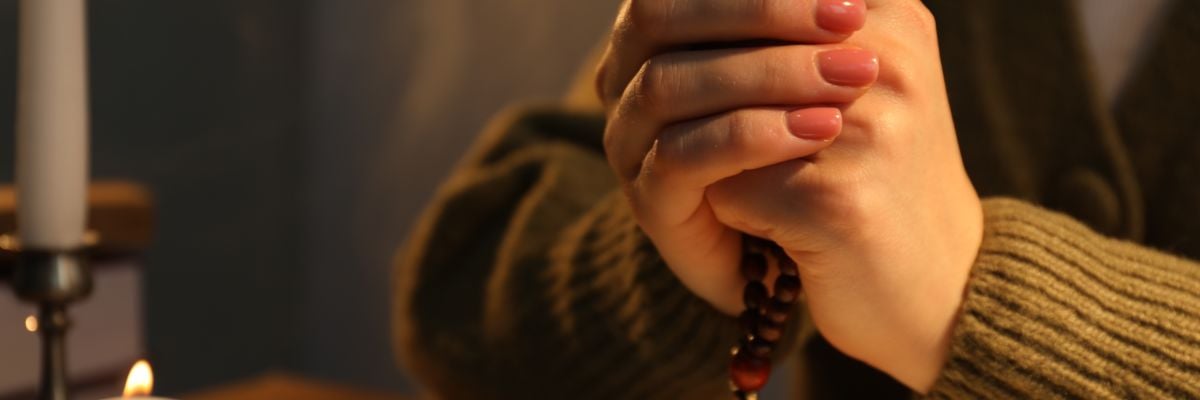
Catholic apologist Joe Heschmeyer joins host Thomas Graf to answer a caller’s question about praying for a loved one who died by suicide and practiced a different religion. Is there hope for salvation in such tragic circumstances? Joe explains how the Church considers mental distress when assessing moral responsibility for suicide, and why Catholics can and should pray for those souls, trusting in God’s mercy to offer them the chance for repentance, even at the hour of death.
Transcript:
Caller: Hi. I have two questions, actually. The first one is about my mom. She wasn’t a believer and she committed suicide when I was six months old.
Joe: I’m so sorry.
Caller: My grandmother keeps telling me I need to keep praying for her. So I don’t know if it’s a lost cause to pray for her, considering she worshipped idols, she was of a different religion, and then she committed suicide. So I have always wondered, is there any… is it even worth it to pray for her?
Joe: So, the Church says yes, the Church says you should. And I’m going to go ahead and quote why. Because we want to say, on the one hand, suicide is a grave offense. It is. You’re doing something horrible to yourself and to those you love and who love you.
But on the other hand, we also recognize that people who do this are often not in their right mind. And you have less moral culpability for things that you do when you’re not in your right mind.
So there’s two things going on there. One is that she apparently didn’t know Jesus in the full sense; she may have been of a different religion. And so we want to pray for her there because, as we know from St. Paul, when he’s talking to the Athenians in Acts 17, he’s able to look at their worship. These are pagans, and he recognizes amongst the gods that they worship is this unknown God. And he recognizes this as the true God.
So we want to take a view that it is possible that in her religious yearning she has come in contact in some way with God and has tried to serve Him, well or poorly, God knows. But we can hold out hope for her there.
There’s a difference. We want to be very clear. There’s a difference between intentional disobedience and an innocent misunderstanding. And so we’re hopeful for her there.
And on suicide, well, let me just quote the Catechism directly. It says, beginning in paragraph 2282, if suicide is committed with the intention of setting an example, especially to the young, it takes on the gravity of scandal; voluntary cooperation in suicide is contrary to the moral law.
So it talks all about how suicide is wicked, it’s evil. But then it says grave psychological disturbances, anguish, or grave fear of hardship, suffering, or torture can diminish the responsibility of the one committing suicide.
Then you look at cases in which people have killed themselves. This is such a strange thing for a human person to do that you immediately have to ask what would cause someone to do this thing that is so destructive to themselves. We spend all this time fighting for self-preservation. Think about it: you eat and you drink and you sleep and you drive with a seatbelt on. You do all of these things because you have deeply ingrained in you this desire to preserve your life.
And yet here’s this action totally contrary to that. And it’s so unusual that we want to say what could lead someone to do that. And if they are not in their right mind, they don’t carry the same moral culpability.
And so then the next paragraph says we should not despair of the eternal salvation of persons who have taken their own lives. By ways known to Him alone, God can provide the opportunity for salutary repentance. The Church prays for persons who have taken their own lives.
And take this for what it’s worth, but there are cases where, you know, saints and visionaries have talked about people who had begun to do whatever action it was that led to their death. They jump off a bridge or they take pills or they do something like this.
And in the time between when they begin this deadly plot and when they actually die, they have a moment of repentance. They realize halfway down, this was wicked. I shouldn’t have done this. And in that split second, it is possible for them to get right with God.
And we simply don’t know. We don’t want to presume the answer to that in either direction. And so, as the Church says, we pray for people who’ve taken their own lives. That’s the only thing we can do.



